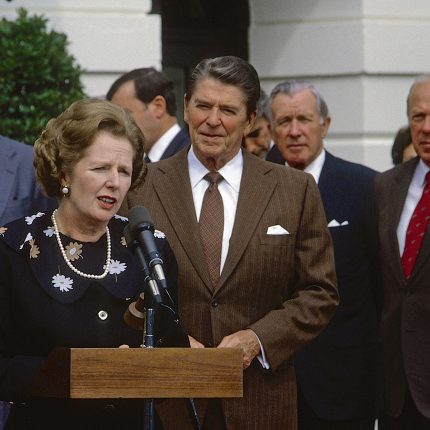
Why Margaret still matters
13 Oct 2025
The lessons of her leadership are still applicable today
This article was first published in The Critic
Upon her election in 1979, Margaret Thatcher arrived in office with a mission to bring inflation down and to wrestle the economy free of trade union control. These were not easy things to achieve. Without them, the rest of her agenda would never have been delivered, and she may have joined the ignoble ranks of post-war Tory mediocrity.
Over the years, Thatcher has been turned into a political saint for much of the British right. Few politicians win three consecutive general elections and provide such a strong economic policy that their party wins a fourth. She is not without her detractors on the right, of course. Today the debate isn’t the same as the old “wets versus dries” or “Brexiteers versus Remainers” that we have been subject to for many years. The ascendant socially-conservative parts of the British right argue that Thatcher’s economic and social policy laid the ground for Tony Blair. Other parts of the New Right think it is time to move on and put aside the hagiography of a Prime Minister who left office in 1990, closer to when England last won the World Cup than to today.
However, her legacy as a politician is such that different parts of the British right take inspiration from a wide range of her achievements. While some admire her union-busting, others refer to her defence of British sovereignty against Argentina at the start of her tenure and against Brussels at the end; the libertarians among us talk about the Big Bang, tax cuts, and privatisation; meanwhile the “Anglofuturist” movement admires the vision and ambition of Canary Wharf and the regeneration of London’s docklands, a central achievement of late-Thatcherism.
Even in an age where immigration is the most important and existential matter facing the country, Thatcher can be looked upon positively. Far from disregarding the British public’s concerns about immigration, she acted on them. She implemented the British Nationality Act 1981 which severely curtailed the rights of Commonwealth citizens to settle in Britain and ended birthright citizenship.
None of this is to ignore the fact that Thatcher operated in a different era with different challenges, although we are currently enduring an inflationary spike and London recently suffered the most comprehensive strikes on the London Underground in years. The past is a foreign country and that is true, in many respects, for the 1980s. It would be foolish to assume that the best way of paying tribute to Thatcherism as an ideology or an instinct would be to say we need to re-run the same policies of the era. We can’t privatise British Telecom again, nor can we sink the Belgrano one more time. After Thatcher’s death in 2013, the former editor of The Spectator, Matthew D’Ancona, said that the British right should not indulge in “mimicry” and avoid “karaoke Thatcherism”, because the challenges facing Britain in the 2010s were so different to those in 1979.
While narrowly correct, this misses the point. First, one can learn thematic lessons from the past and apply them to the present, and indeed one should. After all, ancient wisdom is often the best source of inspiration. Second, when one looks at the fundamental principles which underpinned Thatcherism and motivated the policies of the era, it is hard to dispute their value today.
Thatcher faced an overregulated, overtaxed, and sluggish economy, hemmed in by capital controls, trade union militancy, and nationalised industries. Her nemeses were Arthur Scargill, Michael Foot, the Gang of Four, and the less robust elements within her own party.
The British right certainly faces a different landscape today, but the underlying dynamics are remarkably similar. While we do not have capital controls, we have — since the financial crisis — overregulated our financial services sector and placed huge conditions on the allocation of capital, such as the Listings Regulations which have undermined the London Stock Exchange, or the growth of ESG which mandates that many businesses to follow progressive policies.
We also certainly have problems with trade unions today — though “obstructionism” is a better description than militancy — and the Equality Act has transformed workplaces into litigious and unproductive arenas, where race-based staff networks and the growth of human resources departments have eroded innovation, productivity, and freedom of expression. This might be different to communist-infiltrated unions refusing to accept new machinery in a factory but considering the explicitly revolutionary ideology which underpins Diversity, Equity, and Inclusion, it bears more similarities than it appears initially.
And though the economy isn’t being suffocated by nationalised industries which need to be sold off to receive an injection of dynamism and the guidance of the profit motive, the tax burden is reaching record highs for peacetime, public spending is at unsustainable levels, and welfare dependency has returned with a vengeance. So, while the Britain of the 2020s is without a doubt very different to that of the 1980s — demographically, culturally, economically — the problems it faces and its necessary solutions are of a similar genre.
Thatcherite economics was in its essence about taking steps to remove bureaucratic bottlenecks preventing the proper allocation of capital; expanding home ownership; repairing the public finances; and protecting British sovereignty and the country’s borders. This provided an economic legacy which fostered growth and prosperity into the twenty-first century. Yes, our society may be different today, largely thanks to migration and multiculturalism creating a more diffuse and less unified nation. But the great lesson of Thatcherism was that injecting serious economic thinking into British politics and cultivating a popular, and even populist, appeal can secure three handsome election victories.

